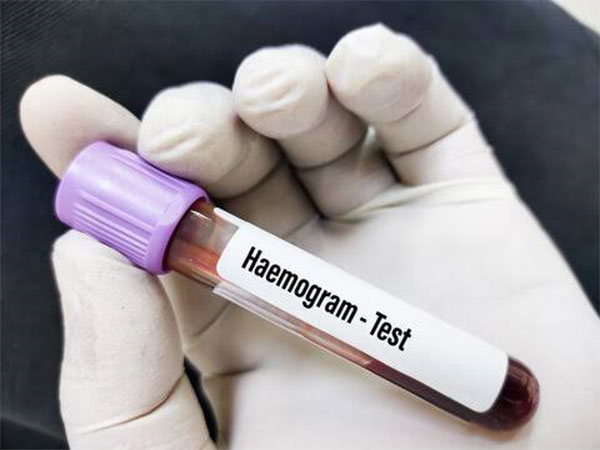Why is a Hemogram Test Prescribed?
Jun 21, 2024

VMPL
New Delhi [India], June 21: The hemogram test, commonly known as the complete hemogram or HMG, is a diagnostic test that offers important details about a person's blood health. This test evaluates general health and helps diagnose several diseases, such as anaemia, infections, and leukaemia.
Blood, an important fluid in our bodies, is responsible for transporting oxygen, nutrients, and waste products. A hemogram test measures components like red and white blood cells, haemoglobin, and platelets, which are essential in identifying diseases and determining overall health status. In this blog, we will know the hemogram test price, why it is prescribed, and how to interpret its results.
What is a Hemogram Test?
The hemogram test, commonly referred to as the complete hemogram or HMG is a series of tests that include the complete blood count (CBC) and the erythrocyte sedimentation rate (ESR). It is important to note that the hemogram test price may differ depending on the diagnostic lab you decide to go with. At Apollo 24|7, the hemogram test costs only Rs660*.
*Prices may vary depending on your location.
Key Components Analysed in a Hemogram Test
These tests measure different components of blood, offering a detailed view of one's haematological health. The key components analysed in this test include:
Component, Function
Red Blood Cells (RBCs), These cells carry oxygen from the lungs to the rest of the body and return carbon dioxide for exhalation.
White Blood Cells (WBCs), These cells are crucial for the immune system, which helps fight infections.
Haemoglobin (Hb), It is the protein in red blood cells that carries oxygen.
Platelets, These help in blood clotting.
Haematocrit, It measures the proportion of red blood cells in the blood.
Erythrocyte Sedimentation Rate (ESR), It measures the rate at which red blood cells settle at the bottom of a test tube, indicating the presence of inflammation.
Why is a Hemogram Test Done?
A hemogram test is performed for various reasons, reflecting its versatility in medical diagnostics. Here are some of the primary reasons of its prescription:
* Routine Health Check-ups: Regular hemogram tests can help in the early detection of potential health issues, even before the symptoms appear.
* Detection of Inflammation: The ESR component of the hemogram test can indicate the presence of inflammation caused by infections, tumours, or autoimmune diseases.
* Symptom Investigation: When patients present with symptoms such as unexplained weight loss, headaches, neck or shoulder pain, pelvic pain, and joint stiffness, this test can help identify underlying conditions.
* Diagnosis and Monitoring: Conditions such as anaemia, leukaemia, temporal arteritis, systemic vasculitis, rheumatoid arthritis, and polymyalgia rheumatica can be diagnosed and monitored.
* Pre-surgical Evaluations: Before surgeries, this test can be done to ensure that the patient's blood health is optimal for surgical procedures.
* Chronic Illness Monitoring: For patients with chronic conditions like diabetes, kidney disease, or heart disease, hemogram tests monitor overall health and disease progression.
* Symptom Analysis: When patients present with non-specific symptoms like fatigue, weakness, or bruising, a hemogram test can help identify underlying causes.
How is the Hemogram Test Performed?
This test is typically performed by drawing a small amount of blood from a vein, usually in the arm. The sample is then analysed in a laboratory to measure the various components.
1. Preparation for the Test
Generally, no special preparation is needed for the test. However, it is advisable to inform your doctor about any medications you are taking, as some drugs can affect blood test results.
2. Interpreting Hemogram Results
Understanding hemogram results is crucial for effective diagnosis and treatment planning. Here's how some of the key components are interpreted:
Component, Normal Range for Men, Normal Range for Women, The Levels May Indicate
Red Blood Cells (RBCs), 4.7 to 6.1 million cells per microlitre, 4.2 to 5.4 million cells per microlitre, Low: Anaemia
High: Dehydration or bone marrow disorders
White Blood Cells (WBCs), 4,000 to 11,000 cells per microlitre, 4,000 to 11,000 cells per microlitre, High: Infection, inflammation, or leukaemia
Low: Bone marrow problems or autoimmune conditions
Haemoglobin (Hb), 13.8 to 17.2 grams per decilitre, 12.1 to 15.1 grams per decilitre, Low: Anaemia
High: Polycythaemia vera or lung disease
Haematocrit, 38.3% to 48.6%, 35.5% to 44.9%, Low: Anaemia
High: Dehydration or other blood disorders
Platelets, 150,000 to 450,000 platelets per microlitre, 150,000 to 450,000 platelets per microlitre, Low: Excessive bleeding
High: Clotting disorders
Erythrocyte Sedimentation Rate (ESR), 0-22 mm/hr, 0-29 mm/hr, Elevated: Inflammation due to infections, autoimmune diseases, or cancers
Note: The values of the tests may differ depending on the labs.
3. Follow-up Steps Based on Results
* Normal Results: Typically, no further action is needed, but regular monitoring might be suggested.
* Abnormal Results: Depending on which component is abnormal, further diagnostic tests may be ordered.
Conclusion
Overall, the hemogram test is a fundamental diagnostic tool that offers comprehensive insights into an individual's blood health. Its ability to detect a wide range of conditions early in the stage, monitor treatment effectiveness, and guide further diagnostic testing, make it indispensable in modern healthcare. Get an affordable hemogram test price at Apollo 24|7, which ensures that everyone can access this crucial diagnostic resource.
(ADVERTORIAL DISCLAIMER: The above press release has been provided by VMPL. ANI will not be responsible in any way for the content of the same)









